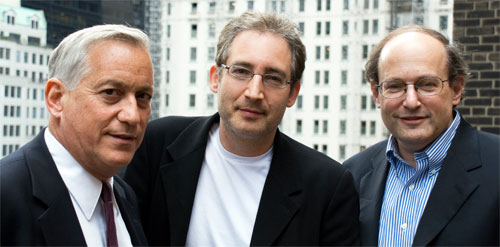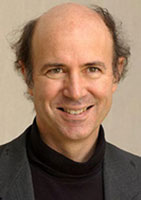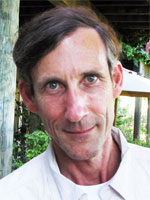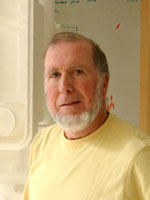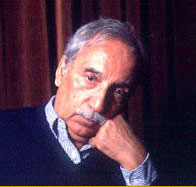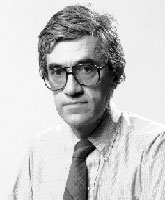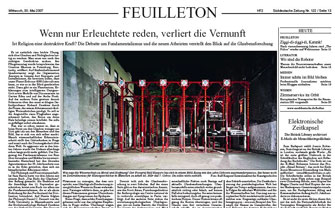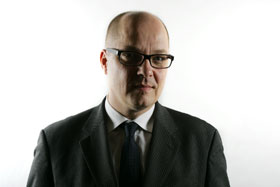BRIAN GREENE: Naturally, scientists quite generally and string theorists in particular often describe their work without giving all of the associated qualifications all of the time. I, for example,have spoken of string theory as a possible final theory, as the possible theory that would unite all forces and all matter in one consistent framework—and I generally try to say—but perhaps not always—that this is not yet a proven theory; this is our hope for what it will achieve. We aren’t certain that this is where it is going to lead. We just need to explore and see where we land.
PAUL STEINHARDT: What angers people, I think, is the notion that the ultimate theory of physics might allow a googol possibilities. That is, even though everywhere we look in the universe has the same laws as far as we can see and seems remarkably smooth and uniform—more uniform than we needed for human existence—somehow we are supposed to believe that the greater universe that we can't ever see is completely different. I think many people wonder whether a theory like that is science, or metaphysics?
WALTER ISAACSON: That's exactly it: we were talking about why it is that it arouses such passion and then started directly debating string theory. I'd love to take it right back to Einstein—twice you said something that I find very interesting, which is, we have to find a way to make his two grand pillars of 20th century physics compatible, general relativity and quantum theory. Of course Einstein totally would believe that, because he loved unification, he loved unity. Secondly he and Newton agreed on one big thing, which is that nature loves simplicity. But I've always wondered about the more metaphysical philosophical question: how do we know that God likes simplicity? How do we know he wants these things to be compatible? How do we know that quantum theory and relativity have to be reconcilable?
Introduction
The coincidence last spring of Walter Isaacson's Einstein biography (Einstein: His Life and Universe) hitting the #1 spot on the New York Times bestseller list, coupled with the publication of The Endless Universe: Beyond The Big Bang by Paul Steinhardt, the Albert Einstein Professor of Science at Princeton University (coauthored with Neil Turok), created an interesting opportunity.
I invited Walter, Paul and Columbia University string theorist, best selling author and TV presenter, Brian Greene, to participate in an Edge symposium on Einstein. Walter, Paul, and Brian, showed up for the session in early June.

Last year, in My Einstein, a book of essays by twenty-four leading thinkers, I asked each of the contributors to share their thoughts on who is their Einstein. This led me to ask the same questions to the Edge symposium participants.
"That's a hard question and there are many answers I'd give," Brian said, "but I'd say my Einstein surrounded learning—not learning, really hearing—in junior high-school that there is this feature of time whereby if you're moving relative to somebody else time elapses at a different rate compared to the person who's stationary, and thinking to myself, that sounds completely nuts, I really want to understand what this is all about. And little by little finally learning what it actually means, and going on from there to try to push the story a little bit further."
Walter's response: "Einstein is obviously my father," he said, "who as an engineer loved science and instilled that in me, but also has a lot of Einstein's moral nature to him, and political morality to him. I remember every day growing up, his asking me questions and pushing me in a certain way. One of the things I've learned as a biographer, and the first thing you learn, is that as you write about your subject, it's all about Dad—for Ben Franklin it's all living up to his father in a certain way; even to Einstein, a bit— his father's an engineer. And then the second thing you learn is, even for the biographer, it's all about Dad, and that's why I wanted to write about Einstein—I shouldn't say my father's an Einstein, he's just an engineer in New Orleans, but that was his aspirational secular saint, and so I wrote the book and dedicated it to my father."
Paul had a similar response. "One of my earliest memories of childhood," he recounted, "was sitting on my father's knee and his telling me stories about scientists and discovery. He wasn't a scientist, he was a lawyer, but for some reason he used to tell me stories about scientists and different discoveries they made—I remember stories about Madame Curie and Einstein and others."
"From that very initial instance, what I wanted to do was be in a field where you got to make discoveries. The thing that always impressed me the more I learned about Einstein was his uncanny ability to take the wealth of phenomena that people were studying at the time, and pick out not only which were the important questions, but which were the important questions that were answerable. There are always lots of questions you'd like to answer, but knowing whether or not you have the technology, the mathematical technology and the right ideas to attack them at the time—that's a real talent. Einstein had the incredible talent to do that over and over and over again, ahead of any of his contemporaries. So, for me he's the ultimate discoverer. That is my Einstein."
Read on.
—JB
BRIAN GREENE is a professor of physics and of mathematics at Columbia University, is the author of The Elegant Universe: Superstrings, Hidden Dimensions, and the Quest for an Ultimate Theory and The Fabric of the Cosmos: Space, Time, and the Texture of Reality. He is also the presenter of the three-part Nova program, The Elegant Universe, available on DVD.
WALTER ISAACSON, the President and CEO of the Aspen Institute, has been the Chairman and CEO of CNN and the Managing Editor of Time magazine. A noted biographer, his books include Benjamin Franklin: An American Life; and Einstein: His Life and Universe.
PAUL STEINHARDT, a physicist, is the Albert Einstein Professor in Science and on the faculty of both the Departments of Physics and Astrophysical Sciences at Princeton University. He is the coauthor (with Neil Turok) of The Endless Universe: Beyond The Big Bang.
Brian Greene's Edge Bio Page
Walter Isaacson's Edge Bio Page
Paul Steinhardt's Edge Bio Page

[11:21 minutes]

